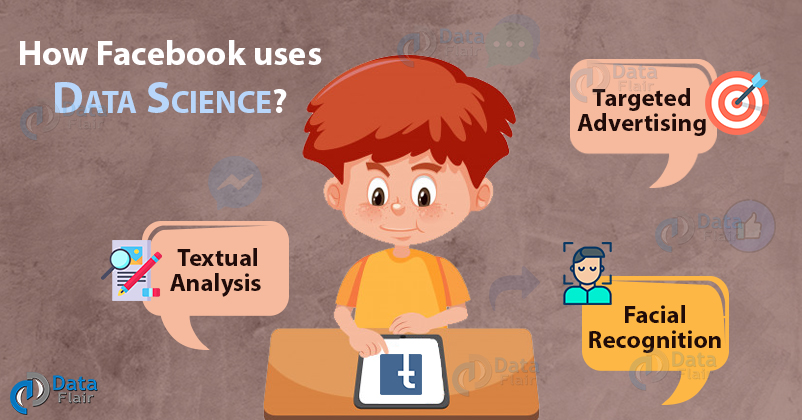How Facebook uses Data Science – Essential Ways & Real-life Examples
Free Machine Learning courses with 130+ real-time projects Start Now!!
Data Science at Facebook
What can data do?
Data can’t do anything. It’s the people who do things with data (they make decisions).
Have you ever seen videos on Facebook that shows a “flashback” of posts, or images – like those you see on your birthday, or on completing a few years of becoming friends with someone? If the answer is yes, you have seen examples of how Facebook uses Data Science.
The average number of hours spent on Facebook by an American is 2 hours. That is 2 hours worth of clicks, likes, comments, and shares that goes into huge databases to be extracted for further analysis.
This is usually done to better understand behaviors and improve the user experience, to create marketing profiles, and a lot more.
How Data Science benefits Facebook
Facebook uses data science in the following 3 ways:
1. Textual Analysis
A large portion of data that is shared on Facebook is text. Facebook uses a tool it developed on its own called DeepText to extract meaning from words we write or post by learning to analyze them.
2. Facial Recognition
One of Facebook’s most recent investments has been in facial recognition and image processing capabilities. Facebook can track its users across the internet and other Facebook profiles with image data provided through users by sharing in their profiles.
It uses an application called DeepFace to teach itself to recognize photos of people. It says that this is the most advanced face recognition tool which is more successful than humans in recognizing two different images of the same person.
3. Targeted Advertising
Facebook uses data science to decide which advertisements to show to which users. Do you ever see sponsored ads on your feed while using Facebook? That’s targeted advertising and I know for sure this happens to you!
If you don’t believe us, try searching the internet for something you have never searched for before. Then, log into Facebook and look at the advertisements that pop up for you. Are they similar to what you searched for? The answer is probably yes.
Here are some real-life examples that show how Facebook uses data science:
1. The Flashback
On celebrating its 10th anniversary, Facebook offered its users to view and share their anniversary of being friends with people on Facebook by making a video of photos and posts shared by them. These were the photos and posts that received the most number of likes and comments on the feed.
Want to become the next Data Scientist?
Check out the 370+ Data Science Tutorials
2. Celebrate Pride
In order to celebrate pride, Facebook introduced rainbow reaction, a way to support the Supreme Court’s judgment for marriage equality. It provided an easy, simple way to transform profile pictures into rainbow-colored ones.
3 million people on Facebook updated their profile pictures to the logo of the Human Rights Campaign.
Are you amazed to look at how cleverly Facebook uses data science as its weapon to effectively use its data and provide a better experience to its users?
Now you might think, what kind of information of its users is collected by Facebook?
1. Things you do and the information you provide:
It collects and stores your content and other information that you provide. For example – your personal details when you sign up, relatives, relationship status, phone number, likes and dislikes, etc.
2. Things others do and the information they provide to Facebook:
It collects information that other people such as your friends and family members provide about you, like when they share a photo of you, with you or send a message to you.
3. Your connections and networks on Facebook:
It collects information about the people and groups you are connected to and how often do you interact with them, such as the people you communicate with the most or the groups you like to share with.
4. Financial information when you purchase on Facebook:
If you use Facebook for any kind of financial transactions like, when you buy something on Facebook, make a purchase in a game, it collects information about that purchase or transaction. This can be related to information about your credit card or debit card number, contact details, etc.
5. Information about how you access Facebook:
It collects information about the computers, phones, or other devices where you install or access its services such as device locations, the name of your mobile operator or ISP, browser type, mobile phone number, IP address, etc.
This is all possible because of data science and machine learning. These technologies play a big role in contributing to the success of companies and helping them to provide unbelievable features to their users.
If you know any other way by which Data Science benefits Facebook, do share them in the comment section. We will definitely add them.
Your 15 seconds will encourage us to work even harder
Please share your happy experience on Google



Very important article. I know that DS is a growing profession and one must agree 100% with the prediction of market demand for DS analysts/statisticians. What strikes me the most is an insight I received while reading this article and that is that in the field of CI (Competitive Intelligence) that I am in, there must be a permanent position for DS personal. DS is an integral part of a healthy CI process. Moreover, these days when there are second thoughts about the future of CI as a profession I think it is necessary to define the roles within CI team, and DS must be included to make CI a real lasting profession, for DS is a sub-profession in CI. Don’t you agree?